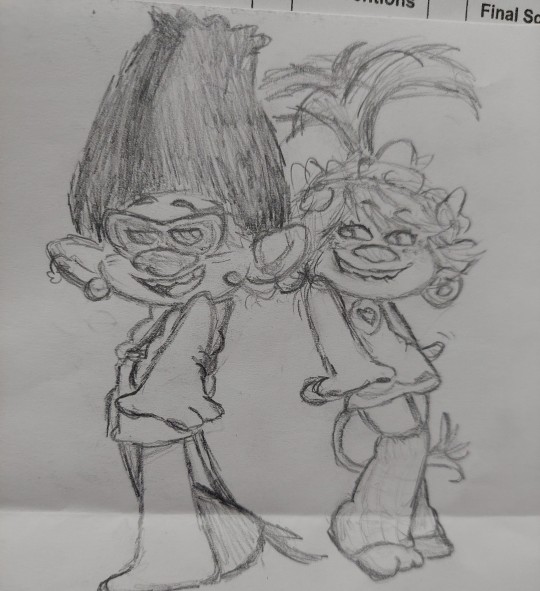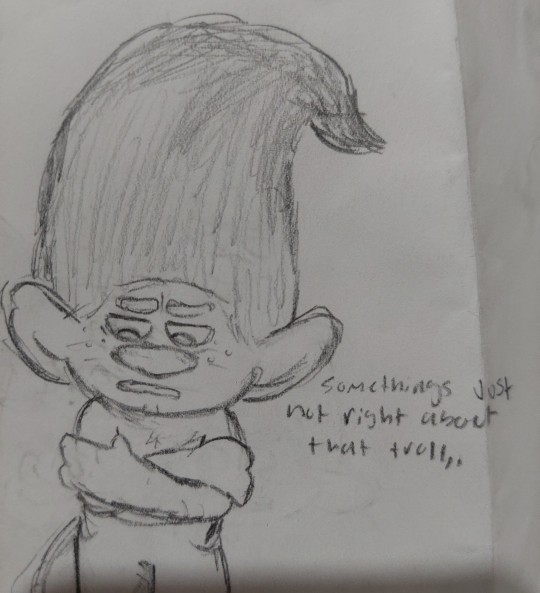#he would like sense that his araus off
Explore tagged Tumblr posts
Text
OBSSEDSED WITH @djmurphy 's HYPNO POP AU



SCHOOL DOODLES SO NOT THE BEST QUALITY 💔 !! BUT WTV
#I thought since creek like does auras or wtv#he would like sense that his araus off#OR THAT BRANCH WOULD PROBALY BE TOO MUCH#LIKE IN THAT ONE TBGO EP#just some thinkss#trolls fandom#dreamworks trolls#trolls#queen poppy#branch trolls#trolls creek#hypno pop au
319 notes
·
View notes
Text
Moderately Interesting Japanese Episode 6: Come at Me, Bro (Fighting Words)

Above: the average Japanese workplace, actual footage
The other day, I was copied in an email in which my boss was a bit ticked off that someone hadn’t recorded the hours they had worked for the month, and he told them this:
首を洗って待ってろ!!!
Kubi wo aratte, mattero!!! Wash your neck and wait!!!
Did my boss think this person’s neck was dirty? What is he waiting for?
Today, I thought I’d introduce a few phrases that revolve around fights/battles.

1. Kubi wo arau (wash your neck)
I daresay that just about everybody knows about the old samurai tradition of committing seppuku or harakiri, and how the samurai would drag a knife through his gut. But did you also know that there was always a man standing beside him prepared to behead him in the event that he couldn’t go through with it?
Before seppuku and before any public executions, the body must be purified. In particular, because beheadings and hangings were the preferred method of execution in Japan for centuries, it was very important to wash your neck. So if someone tells you to wash your neck, it means your time has come.
It’s most commonly used just like my boss said,
首を洗って待ってろ! Kubi wo aratte mattero! Wash your neck and wait!

2. Kenka wo uru (sell a fight)
The first time I heard this, I actually laughed because the idea of “selling” a fight was humorous to me. But if you can imagine picking a fight by saying outrageous things with just as much passion as a man on a soapbox selling snake oil, the expression makes plenty of sense.
The expression is most often used like this:
ケンカ売ってんのか、こら?! Kenka utten noka, kora?! (Note: “utten” is a more casual way to say “utte iru” “You tryin to start somethin, huh?!”

3. Kenka wo kau (buy a fight)
Obviously, if someone’s selling something, you’re gonna have to buy it!
The usage of this expression isn’t as set as its companion “kenka wo uru” is, but I usually see it in some variation of:
ケンカを売ってるなら、買うぞ Kenka wo utteru nara, kau zo If you’re selling a fight, I’ll buy it! (Or, for a more natural English expression, “If you’re starting a fight, I’ll finish it!”)

4. Omae no kubi da (it’s your neck)
This expression goes back to Japan’s history of beheading and hanging as the standard methods of execution. It can mean that someone is fired from their job, or it’s a warning like the English “you’re risking your neck” or “it’s on your head.”
Example for “you’re fired” Wife: あら、おかえり!どうしてこんなに早く帰ってきたの? Husband: 首になった。 Wife: えっ?首? Husband: あ、首。
Wife: Oh, welcome back! Why are you home so early? Husband: I got fired. (Literally, “it became my neck”) Wife: What? Fired? (Literally, “neck?”) Husband: Yeah, fired. (Literally, “neck”)
Example for warnings このふざけた計画はお前が考えたから、失敗し��らお前の首だぞ Kono fuzaketa keikaku ha omae ga kangaeta kara, shippai shitara omae no kubi da zo. You’re the one who thought up this stupid plan, so if it fails it’s on your head.

5. Sukedachi itasu (to be the helping sword)
This is probably one of my favorite expressions in Japanese. I have a lot of favorite expressions, but I mean it with this one.
助太刀 (sukedachi) is composed of the following two words:
助 (suke) help, assistance
You likely know the verb 助ける (tasukeru, to help, to aid),
For some linguistic reason, the “ta” of it falls off in some cases. You see this most commonly in male names. “Sasuke,” “Shinnosuke,” and any other name that ends in “suke” can be written with 助 at the end.
太刀 (tachi/dachi) literally “thick blade,”
The tachi was a blade slightly larger and more curved than a katana.
There was also the kodachi, which was too big to be called a knife and too small to be called a sword.
Sukedachi refers to a person who would provide backup in a fight. It’s the “I’ve got your back” of Japanese, and this expression has been around since the Muromachi Era (early 14th century). You add the verb suru or its humble form itasu to create the phrase “I’ll be the helping sword.”
Nowadays, people aren’t running around with swords vowing to avenge their friend should they fall in battle, yet this expression is still used with surprising frequency. I actually hear it at work at least once a week.
Senpai: やばい、クライアントに英語での発表求められているけど、俺の英語に自信がない。 Kohai: 大丈夫っすよ!僕1年アメリカで留学したから、困ったら助太刀いたす!
Senpai: Shoot, the client’s asking for the presentation to be in English, but I have no confidence in my English. Kohai: Relax! I studied abroad in America for a year, so if you need help I got your back!
Sukedachi itasu is used for comedic effect. You sound like you’re a samurai willing to lay your life on the line for your friend, when really you’re just talking about helping your friend with a presentation haha.
You should try using this in the next conversation you have in Japanese. I guarantee your Japanese friends will be impressed!

6. Bibiru (to rattle)
Ask a random Japanese person where they think the word bibiru comes from, and they’ll almost invariably tell you that they think it’s slang. Japanese has an interesting feature in which you can slap a る(ru) on to a noun or onomatopoeia and transform it into a verb, sort of like how you can slap an -ed or -ing on a noun in English and turn it into a verb.
Some slang verbs commonly used in Japanese are:
ググる guguru (abbreviation of “google” plus “ru”), “to google something”
サボる saboru (abbreviation of “sabotage” plus “ru”), “to skip work/school”
However, bibiru isn’t the slang that many Japanese people think it is. It has been around since the Heian Era (9th century AD)! “Bibi” is the sound of armor plates clashing together on the battlefield, and bibiru is to feel the rush of fear a warrior feels as he watches the enemy surge towards him.
How cool is that?!
This expression can be used like this:
登山の途中に突然にクマが出てきて、ちょうびびった。 Tozan no tochuu ni totsuzen ni kuma ga detekite, chou bibitta. Halfway through climbing the mountain, a bear came out of nowhere and I freaked.

7. Ashi wo arau (to wash your feet)
This expression provides an interesting insight into Japanese culture. In English, if you get involved in an unpleasant event and you want never to think of it again, you “wash your hands” of it. For example, “I decided to wash my hands of crime when I was sent to jail.”
In Japanese, this sentence would literally be “I decided to wash my feet of crime when I was sent to jail.”
How is it that English and Japanese can have such similar expressions that use polar opposite appendages?
Well, first you have to recall the great importance Japanese culture puts on separating 内 (uchi) and 外 (soto). Literally “inside” and “outside” respectively, uchi and soto are how people and the world in general are categorized and separated in the mind.
For example,
Yourself (uchi) vs. others (soto)
Your home (uchi) vs. outside the home (soto)
Family (uchi) vs. strangers (soto)
Your own village (uchi) vs. another village (soto)
Japan (uchi) vs. other countries (soto)
This is such an internalized thought process that when I bring up the concepts of “uchi” and “soto,” most Japanese people are very startled because they have gone their whole lives unaware that they were looking at the world this way.
Anyways, one of the most important tenets of uchi and soto is that the uchi is pure, soto is impure, and that impure things from soto are never to be brought into uchi. “Impure” can refer to anything unclean both in the physical and metaphorical sense, like tracking in dirt on your shoes or committing a crime.
As I’m sure you know, it is customary to remove your shoes before entering a home in Japan. This tradition stems from the practical necessity of removing shoes to keep from ruining tatami mats with dirt, water, or scuffing, but the other reason is that you have left your home (uchi) and gone to soto, and your shoes have touched the impure soto. In order to keep impurities from getting into your home, you must take off your shoes before entering it.
So to get back to the “ashi wo arau” expression, the concept behind it is that, if you do something impure in soto (such as getting into a fight and hurting someone, or anything else you regret), that impurity remains on your feet and you must rid yourself of that impurity before moving on and returning to your uchi.
That was a bit of a long and winding explanation, but I hope it made sense. Maybe I’ll make an entire Moderately Interesting Japanese post on uchi and soto in the future if people are interested, because it’s a very deep topic that provides great insight into Japanese culture.
#moderately interesting Japanese#japanese#japanese language#study japanese#learn japanese#kanji#study kanji#learn kanji#jlpt#anime#manga#action#one punch man#opm#japanese vocab#japanese vocabulary#linguistics#japanese linguistics#japanese culture#japanese history#samurai#nihongo#fighting words
1K notes
·
View notes